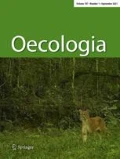Conclusion
For the abovementioned reasons, and with all due respect to the scholarship of Mansson and McGlade, who display a deep knowledge of thermodynamics and ecology, I cannot agree that Odum's use of energy concepts is “wholly discredited”. Refinements from microscopic thermodynamics may not have been faithfully carried along in his work, but does ecology really need these? Remember — the “meal test”.
Having tussled with ecological complexity myself, I stand in awe of this man who has faced up to what most ecologists today are trying to deny — intractable, crushing, defeating complexity. If Odum has provided some of the first shaky stepping stones across this gulf, that's enough.
I can finish by quoting from ny Festschrift paper again:
It is often said of scientists who make unusual contributions against the grain of their disciplines that they are ahead of their time. In H.T. Odum's case, with maximum power, energy-circuit diagrams, emergy, transformity, and energy value the linchpins of a whole new theory of ecology, and paradigm within systems ecology, this can certainly be stated without hesitation. But in this instance, it is also possible to turn the observation around and suggest that ecology-as-science is behind its time, lagging the curve of need foreseen decades ago by a more pragmatic ecology-as-ethic and-concern. The growing man-and-environment tension, fostered by so-far unabatable growth of populations, technologies and economies, demands a science that incises complexity, finds the essence of systemness, and produces quantitative methods capable of moulding this essence to meet the imperatives of the new environmentalism. H.T. Odum has not, perhaps, provided a definitive theory to do this; no one could right now. But, he has given us an intriguing mix of “science”, “art” and “religion” that stands as one of the singular legacies of 20th-century ecology, pointing the way toward a new ecology of complexity that must, I think from need, fully arise in the 21st century. His time has been behind him.
Similar content being viewed by others
References
Ford LR, Fulkerson DR (1962) Flows in networks. Princeton Unversity Press, Princeton, New Jersey
Månsson BA, McGlade JM (1993) Ecology, thermodynamics and H.T. Odum's conjectures. Oecologia 93:582–596
Patten BC (1983) Linearity enigmas in ecology. Ecol Model 18:155–170
Patten BC (1993) Environs, emergy, transformity and energy value. In: Hall CAS (ed) Maximum power: application of the ideas of Howard Odum to ecology, economics and engineering. University of Colorado Press, Boulder, Colorado, in press
Peters RH (1991) A critique for ecology. Cambridge University Press, Cambridge, England
Author information
Authors and Affiliations
Rights and permissions
About this article
Cite this article
Patten, B.C. Toward a more holistic ecology, and science: the contribution of H.T. Odum. Oecologia 93, 597–602 (1993). https://doi.org/10.1007/BF00328970
Issue Date:
DOI: https://doi.org/10.1007/BF00328970




